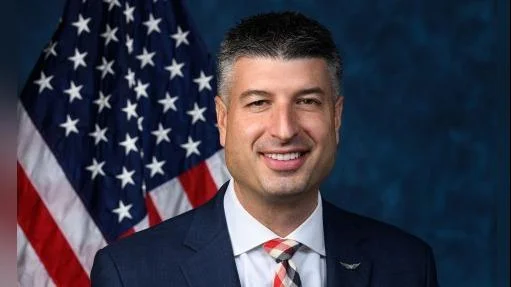Thomas Barrett, U.S. Representative of Michigan's 7th Congressional District | https://barrett.house.gov/
Thomas Barrett, U.S. Representative of Michigan's 7th Congressional District | https://barrett.house.gov/
Congressman Tom Barrett of Michigan’s 7th Congressional District has highlighted the impact of recent tax relief legislation on working families and small businesses in the Lansing area. In an op-ed published in the Lansing State Journal, Barrett described his visits across mid-Michigan during August, which included meetings with workers and small business owners. He was joined by U.S. Small Business Administrator Kelly Loeffler for discussions in Shiawassee County.
Barrett credited Congress and the Trump administration for passing what he called a significant financial boost to Michigan residents through the One Big Beautiful Bill Act. According to Barrett, this law allows working-class individuals to retain more of their earnings rather than sending them to the federal government.
“I spent the month of August home in mid-Michigan, hearing from workers about this tax relief. I recently hosted Small Business Administrator Kelly Loeffler at a meeting with manufacturing workers in Owosso, where we also held a roundtable with small business leaders to hear how this tax relief is directly benefiting the region. There’s no doubt about it. Mid-Michigan workers and businesses not only support this tax relief, they’re counting on it,” Barrett stated.
He addressed criticism that the bill favors wealthier Americans, asserting that Congress ensured permanence for income tax cuts first enacted in 2017 for working families and small businesses. Barrett argued that without these changes, average taxpayers in Michigan would have faced higher taxes.
“While opponents falsely claim this bill is nothing more than a tax cut for the rich, Congress proudly prevented the largest tax hike in history by making the 2017 income tax cuts for working families and small businesses permanent. If Democrats had their way, the average Michigan taxpayer would have been stuck paying $2,151 more in taxes. We avoided this devastating tax hike and secured long-lasting relief for the people of mid-Michigan,” he wrote.
Barrett said that making these provisions permanent protects employees’ paychecks and helps local businesses invest further in their communities.
“This permanent win not only directly protects employees’ hard-earned paychecks, but it also helps thousands of small businesses in mid-Michigan, preserving their resources so they can invest in the community and keep hiring local workers,” he added.
The new law expands upon previous measures by eliminating certain taxes on overtime pay and tip income—changes intended to benefit manufacturing workers as well as those employed in service industries such as restaurants and delivery services.
“Our tax relief law doesn’t stop there. It builds on the 2017 tax cuts and delivers additional relief for working people. It eliminates taxes on some overtime pay, so those who put in extra hours on the manufacturing line, including the workers we met in Owosso, will take home even more of their income. The bill also removes taxes on some income from tips for waitstaff, bartenders, delivery drivers, and thousands of other workers in mid-Michigan,” said Barrett.
He noted that these policies could increase take-home pay for an average family of four by up to $9,900 annually due to expanded credits like a $2,200 Child Tax Credit.
“Thanks to these new pro-worker tax policies and other provisions like the expanded $2,200 Child Tax Credit, the average Michigan family of four could see their take-home pay increase by as much as $9,900,” he explained.
Barrett believes these changes will help lower costs for families while supporting economic growth throughout mid-Michigan by providing incentives for work and reducing taxation on supplemental earnings such as overtime or tips.
“All this tax relief will lower costs for families while boosting mid-Michigan’s economy. More money enables people to pay for the child care or transportation they need when they go to work. No tax on overtime will also provide an incentive for recruiting people to fill jobs at local factories, construction companies and other businesses that ask staff to work overtime, and no tax on tips will allow those in the expanding service industry to keep more of what they earn,” he wrote.
The legislation also includes modest work requirements tied to Medicaid and food assistance programs aimed at able-bodied recipients without children—a move designed to encourage employment participation.
“On top of working-class tax relief, the new law also encourages employment, promotes the dignity of work, and strengthens Medicaid and food assistance by implementing modest work requirements for able-bodied recipients without children,” said Barrett.
He concluded his message with a commitment: “As I meet with hardworking people, the message I hear is clear: This historic tax relief is a massive victory for our economy, and working families and small businesses are the big winners.”
Barrett pledged ongoing support: “Whether you work the assembly line in a Lansing factory, harvest crops on a Williamston farm, or wait tables at a restaurant in Grand Ledge, I’ll continue to deliver for you, your family, and mid-Michigan communities.”






 Alerts Sign-up
Alerts Sign-up